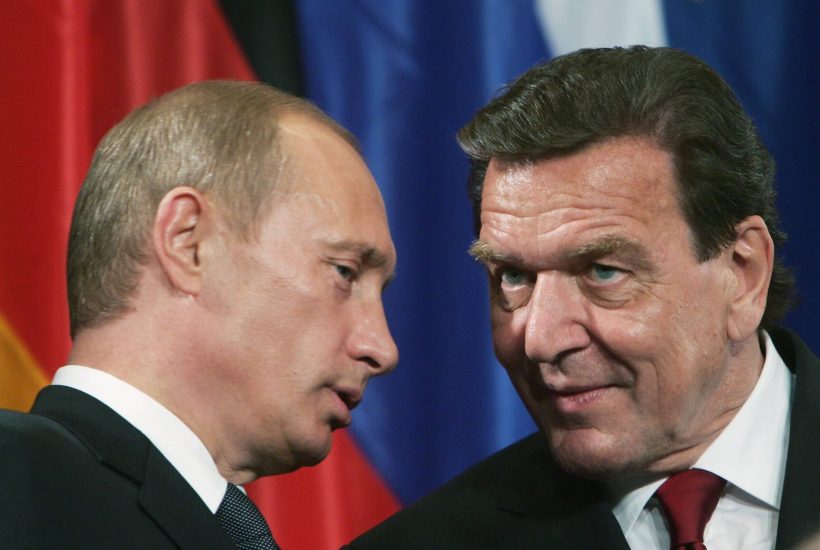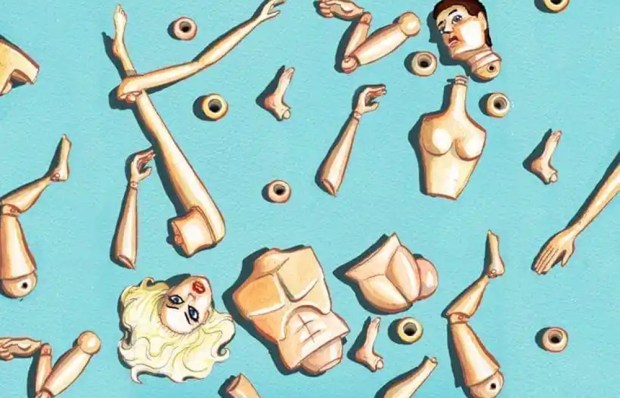From the start of the war in Ukraine, the democratic world has shown striking unity in the economic boycott of Russia. But sanctions are always a blunt instrument: aimed at the regime, they end up harming the whole population. Ordinary Russians, too, are victims of Vladimir Putin’s corruption and misrule. Far better to target the Kremlin and those close to it.
The system of targeted sanctions on named individuals is one way of doing this. Action has now been taken against 1,086 people, with assets suspended and travel bans imposed. To go after the rich and powerful is always a test for democracies, especially if such people are generous in their donations to political parties or have close political connections. One Putin crony in particular is becoming a test case in the efficacy of sanctions: Gerhard Schröder.
Since stepping down as German chancellor in 2005, Schröder has been in the pay of the Kremlin. He has taken jobs with oil companies close to Putin, becoming Moscow’s man in Germany. His refusal to resign from these companies or reject his nomination to the supervisory board of Gazprom following the Russian invasion of Ukraine in February has unquestionably implicated him in Putin’s aggression. So how serious is the West about targeted sanctions?
Schröder’s fellow Germans want action. The Christian Democrats say he is ‘complicit in financing the brutal war in Ukraine’. They want his assets frozen and travel curtailed. The state of Hanover accuses him of crimes against humanity. There are calls for the EU to do the same – but so far, nothing has been done. The Social Democrats, the party he once led, want him kicked out. But Olaf Scholz, his successor as leader, has been reluctant to act. It almost seems as though former world leaders are above Europe’s laws.
As Schröder explained in an interview with the New York Times last month, as far as he is concerned, it was sensible for Germany to increase imports of Russian gas because it was beneficial for both countries. Putin’s gas helped turn Germany into an industrial powerhouse. By the time the Ukrainian invasion began, German energy firms were buying €200 million of gas a day. At the same time, Schröder argued that trade was the best way to help to stabilise Russia and prevent it from retreating backwards into communism – which seemed a realistic prospect in the mid-1990s.
Schröder was not alone in believing that trade was the route to political stability with erstwhile Cold War foes. David Cameron and George Osborne similarly built up economic ties with China on the basis that, while it might not be a liberal democracy, liberal capitalism in the form of trade and business deals might help push it in the right direction. The Germans even have an expression for this – Wandel durch Handel, or ‘change through trade’. Germany’s deal to import more Russian gas, Schröder argued, was a latter-day version of Ostpolitik – Willy Brandt’s policy of cooperation in West Germany, in spite of the Berlin Wall – which he believes helped to lay the foundations for German reunification.
The whole concept now looks dangerously naïve. The perils of allowing Europe to become dependent on Russian gas have become clear. Putin made the calculation that he would be able to get away with helping himself to parts of the old Soviet empire because European countries would not be able to afford to wage economic war against Russia any more than they would dare to engage in military conflict. In many ways, he was correct. It now seems incredible that the deal to build the Nord Stream 2 Russia-to-Germany pipeline was signed a year after the annexation of Crimea. Western governments and corporations simply ignored that act of aggression. They were more interested in cheap energy than in standing up for the democratic rights of Ukrainians. A demilitarised Europe, highly dependent on Russian energy, suited Putin just fine. It helped that European governments were fixated on achieving net-zero carbon emissions, which discouraged serious investment in the North Sea and in shale gas.
It is easy now to fault the policy of becoming too dependent on Russian gas, and many western politicians are implicated in this decision. But it is not past misjudgments which should earn Gerhard Schröder a place on Britain’s list of sanctioned individuals: it is his steadfast refusal to sever his links to the Putin regime even now, when Russian forces have been targeting civilians in Ukraine. ‘I don’t do mea culpa,’ he said last month. ‘It’s not my thing.’ He talks as if he is untouchable. His entire staff recently resigned in protest prior to the stripping of his parliamentary privileges.
He is much more than a political leader persuaded through circumstance to do a deal with the devil. He has chosen to maintain a personal friendship with Russia’s malignant dictator and keep taking his money even after the unprovoked invasion of a neighbouring country. He is as compromised as Putin’s Russian cronies. If Britain is to take action against them – and it is quite right that we have done so – there is no excuse for not also taking action against Schröder.
Got something to add? Join the discussion and comment below.
Get 10 issues for just $10
Subscribe to The Spectator Australia today for the next 10 magazine issues, plus full online access, for just $10.
You might disagree with half of it, but you’ll enjoy reading all of it. Try your first month for free, then just $2 a week for the remainder of your first year.














Comments
Don't miss out
Join the conversation with other Spectator Australia readers. Subscribe to leave a comment.
SUBSCRIBEAlready a subscriber? Log in